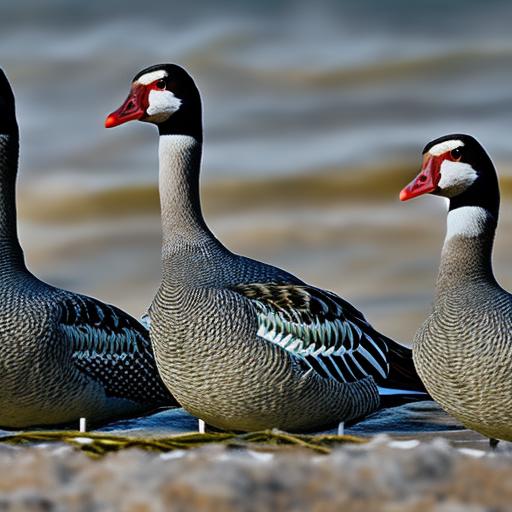Beaches are a popular destination for people looking to relax, play, and enjoy the natural beauty of the coastline. However, in recent years, the presence of geese on beaches has become a growing concern for beachgoers, local authorities, and wildlife agencies. Geese are known to cause a variety of issues on beaches, including environmental damage, safety hazards, and health risks. As such, it is important to understand the impact of geese on beaches, develop strategies for keeping them off the beach, implement non-harmful deterrents, work with local authorities and wildlife agencies, and educate the public about the importance of keeping geese off beaches.
Key Takeaways
- Geese can have a significant impact on beaches, causing environmental damage and health concerns.
- Geese contribute to beach erosion and water pollution through their droppings, which can contain harmful bacteria.
- Strategies for keeping geese off beaches include habitat modification, visual deterrents, and physical barriers.
- Non-harmful deterrents such as sound devices and trained dogs can effectively discourage geese from congregating on beaches.
- Collaboration with local authorities and wildlife agencies is essential for implementing effective geese management plans and ensuring compliance with regulations.
Understanding the Impact of Geese on Beaches
Geese can have a significant impact on beaches, both environmentally and socially. From an environmental perspective, geese can cause damage to the beach ecosystem by overgrazing on vegetation, leading to erosion and loss of habitat for other wildlife. Their droppings can also contribute to nutrient pollution in the water, leading to algal blooms and decreased water quality. From a social perspective, geese can pose safety hazards to beachgoers, especially young children, by becoming aggressive when protecting their nests or young. Additionally, their droppings can create unsanitary conditions, leading to health risks for beach visitors. Understanding the impact of geese on beaches is crucial in developing effective strategies for managing their presence and mitigating their negative effects.
On the other hand, geese are also a part of the natural ecosystem and play an important role in maintaining ecological balance. It is important to find a balance between protecting beaches and respecting the natural habitat of geese. This requires a comprehensive understanding of the behavior and habits of geese, as well as the environmental factors that attract them to beaches. By understanding the impact of geese on beaches, we can develop strategies that are both effective in managing their presence and respectful of their role in the ecosystem.
Strategies for Keeping Geese off the Beach
There are several strategies that can be employed to keep geese off the beach. One approach is to modify the physical environment of the beach to make it less attractive to geese. This can include planting vegetation that is unappealing to geese, installing barriers such as fences or netting to prevent access to certain areas, and using landscaping techniques that discourage geese from congregating on the beach. Another strategy is to use sound and visual deterrents to scare away geese. This can include using loud noises, such as propane cannons or recorded distress calls of geese, as well as visual deterrents like predator decoys or reflective tape. These methods can be effective in deterring geese from settling on the beach without causing harm to the birds.
Furthermore, implementing hazing techniques can also be effective in keeping geese off the beach. This involves using trained dogs or other animals to chase away geese and disrupt their behavior patterns. By consistently applying these strategies, beach managers can create an environment that is less attractive to geese and reduce their presence on the beach.
Implementing Non-Harmful Deterrents
It is important to emphasize the use of non-harmful deterrents when managing geese on beaches. While it may be tempting to resort to lethal methods or harmful chemicals to control geese populations, these approaches can have negative consequences for both the environment and other wildlife species. Instead, non-harmful deterrents offer a more sustainable and ethical approach to managing geese on beaches.
One non-harmful deterrent that has been proven effective is the use of habitat modification. By altering the physical environment of the beach through landscaping and vegetation management, beach managers can create an environment that is less appealing to geese. This approach not only deters geese from settling on the beach but also promotes a healthy and diverse ecosystem.
Another non-harmful deterrent is the use of hazing techniques, such as trained dogs or other animals, to disrupt the behavior patterns of geese. This method is effective in keeping geese off the beach without causing harm to the birds or other wildlife. Additionally, sound and visual deterrents can be used as non-harmful methods to scare away geese without resorting to lethal means. By implementing non-harmful deterrents, beach managers can effectively manage geese populations while minimizing negative impacts on the environment.
Working with Local Authorities and Wildlife Agencies
Collaboration with local authorities and wildlife agencies is essential in developing and implementing effective strategies for managing geese on beaches. Local authorities play a key role in regulating beach management practices and enforcing policies related to wildlife management. By working closely with local authorities, beach managers can ensure that their efforts to keep geese off the beach are in compliance with regulations and guidelines.
Wildlife agencies also provide valuable expertise and resources for managing geese populations in a responsible manner. These agencies can offer guidance on best practices for wildlife management, provide training on non-lethal deterrent methods, and assist in monitoring and evaluating the effectiveness of management strategies. By collaborating with wildlife agencies, beach managers can access valuable support and knowledge that can enhance their efforts to keep geese off the beach.
Furthermore, partnerships with local conservation organizations and community groups can also be beneficial in raising awareness about the importance of managing geese on beaches and garnering support for conservation efforts. By working together with various stakeholders, beach managers can create a unified approach to addressing the issue of geese on beaches and promote sustainable management practices.
Educating the Public about the Importance of Keeping Geese off Beaches

Educating the public about the impact of geese on beaches and the importance of keeping them off is crucial in garnering support for conservation efforts. Many beachgoers may not be aware of the negative effects of geese on beaches or the potential risks associated with their presence. By raising awareness about these issues, beach managers can engage the public in efforts to keep geese off the beach and promote a greater understanding of the need for responsible wildlife management.
One approach to educating the public is through outreach and communication efforts. This can include distributing informational materials at beach entrances, posting signage about the impact of geese on beaches, and engaging with visitors through educational programs and events. By providing information about the ecological importance of maintaining a healthy beach ecosystem and the potential risks associated with geese presence, beach managers can empower beachgoers to support efforts to keep geese off the beach.
Additionally, involving local schools and community groups in educational initiatives can help foster a sense of stewardship for beaches and wildlife among future generations. By incorporating environmental education into school curricula and organizing community outreach events, beach managers can instill a greater appreciation for the natural environment and promote responsible behavior among beach visitors.
Conclusion and Future Considerations
In conclusion, managing geese on beaches requires a comprehensive approach that considers their impact on the environment, social dynamics, and ethical considerations. By understanding the impact of geese on beaches, developing strategies for keeping them off the beach, implementing non-harmful deterrents, working with local authorities and wildlife agencies, and educating the public about the importance of keeping geese off beaches, beach managers can effectively address this issue while promoting responsible wildlife management practices.
Looking ahead, it is important to continue monitoring and evaluating the effectiveness of management strategies for keeping geese off beaches. This may involve conducting regular surveys of geese populations, assessing changes in beach vegetation and habitat conditions, and soliciting feedback from beach visitors about their experiences. By continuously refining management approaches based on new information and insights, beach managers can adapt their strategies to effectively address evolving challenges related to geese on beaches.
Furthermore, ongoing research into innovative deterrent methods and technologies can provide valuable opportunities for enhancing management practices for keeping geese off beaches. By staying informed about advancements in wildlife management techniques and collaborating with experts in the field, beach managers can leverage new tools and approaches to improve their efforts in managing geese populations on beaches.
In conclusion, addressing the issue of geese on beaches requires a multi-faceted approach that integrates ecological considerations, ethical principles, and community engagement. By working together with local authorities, wildlife agencies, and the public, beach managers can develop sustainable solutions for keeping geese off beaches while promoting a healthy and vibrant coastal environment for all to enjoy.
If you’re looking for effective ways to keep geese off the beach, you might also be interested in learning about how to build a secure chicken coop. A well-designed coop can help protect your chickens from predators and provide a safe environment for them to thrive. Check out this informative article on chicken coop design in Chester, SC for valuable insights on creating a functional and secure space for your feathered friends.
FAQs
What are some effective methods to keep geese off the beach?
Some effective methods to keep geese off the beach include using visual deterrents such as scarecrows or reflective tape, employing noise deterrents like propane cannons or bird distress calls, and using physical barriers such as fencing or netting.
Why is it important to keep geese off the beach?
It is important to keep geese off the beach to maintain a clean and safe environment for beachgoers. Geese droppings can create unsanitary conditions and pose health risks, and their presence can also disrupt the natural ecosystem of the beach.
Are there any environmentally friendly methods to keep geese off the beach?
Yes, there are environmentally friendly methods to keep geese off the beach. These include using natural deterrents such as planting tall grasses or shrubs to create an inhospitable environment for geese, and employing trained dogs to patrol the beach and deter geese without harming them.
What are some potential risks associated with geese on the beach?
Some potential risks associated with geese on the beach include the spread of diseases through their droppings, damage to beach vegetation and ecosystems, and the potential for aggressive behavior towards beachgoers, especially during nesting season.
Are there any regulations or laws regarding the removal of geese from beaches?
In some areas, there may be regulations or laws regarding the removal of geese from beaches, especially if they are protected species. It is important to consult with local wildlife authorities or environmental agencies before implementing any geese deterrent measures.
Meet Walter, the feathered-friend fanatic of Florida! Nestled in the sunshine state, Walter struts through life with his feathered companions, clucking his way to happiness. With a coop that’s fancier than a five-star hotel, he’s the Don Juan of the chicken world. When he’s not teaching his hens to do the cha-cha, you’ll find him in a heated debate with his prized rooster, Sir Clucks-a-Lot. Walter’s poultry passion is no yolk; he’s the sunny-side-up guy you never knew you needed in your flock of friends!







